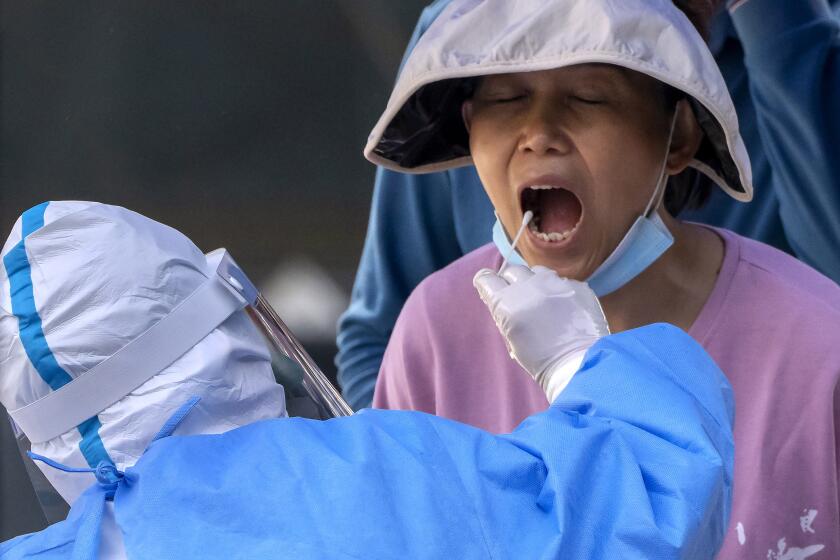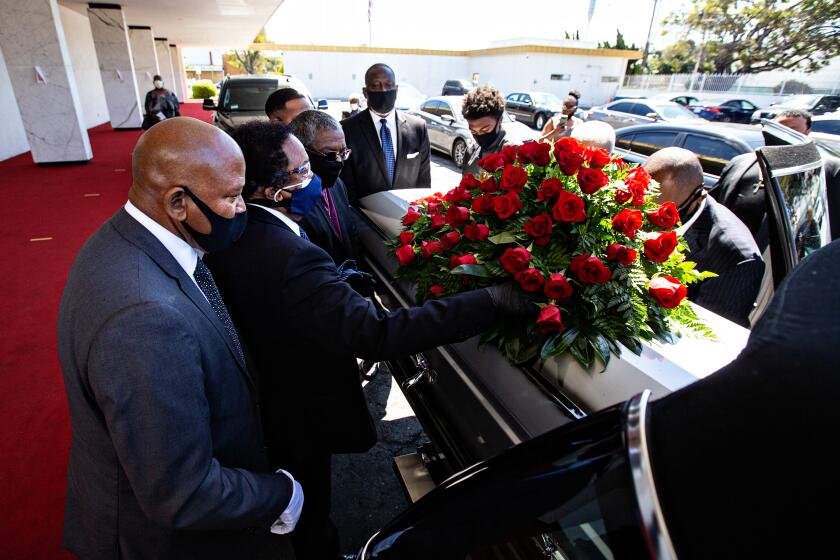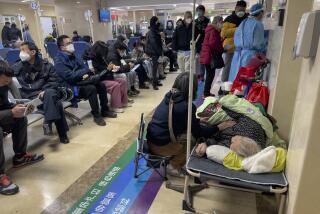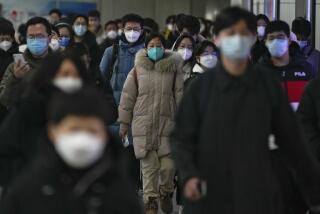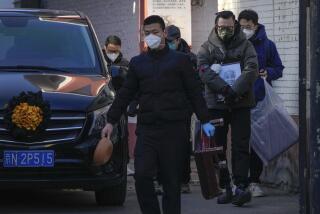Shanghai re-tightens COVID restrictions, frustrating residents
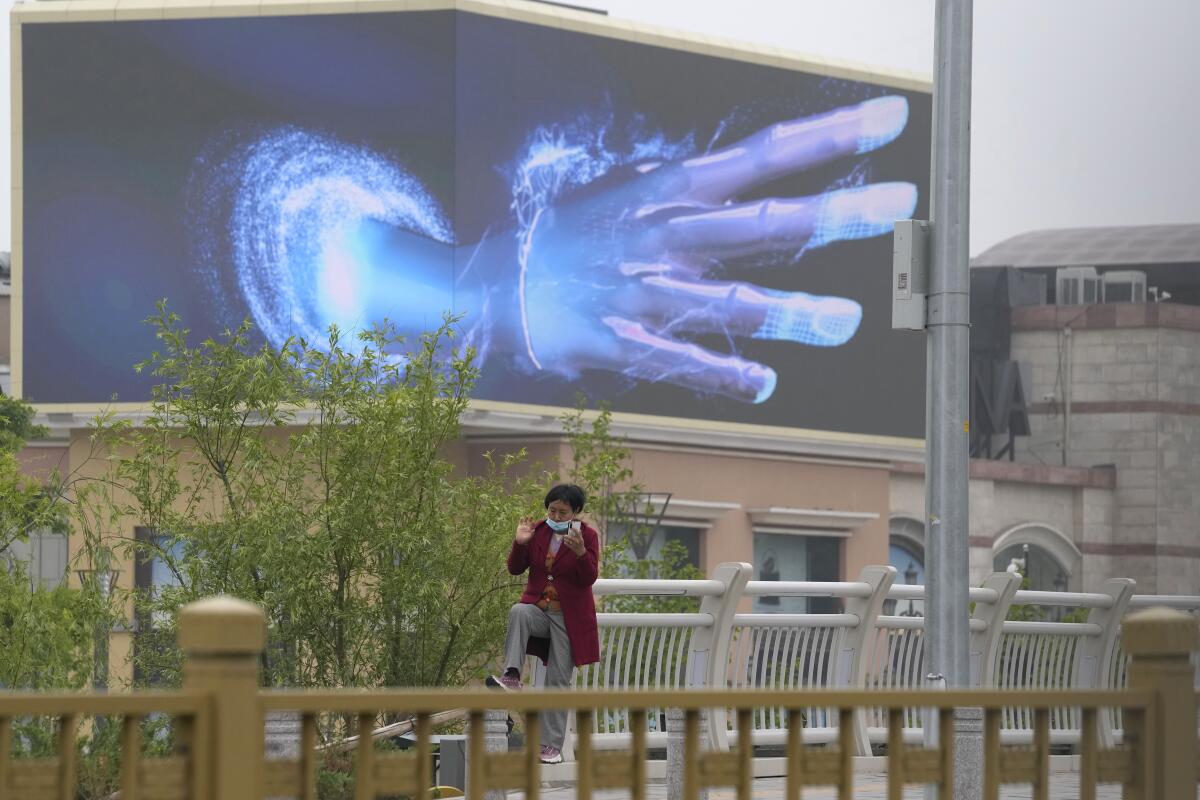
- Share via
BEIJING — The city of Shanghai is doubling down on pandemic restrictions after a brief period of loosening up, frustrating residents who were hoping that a lockdown already more than a month old was finally easing as the number of new cases falls in China’s financial center.
On Tuesday, service was suspended on the last two subway lines that were still operating, marking the first time the city’s entire system has been shut down, according to the Paper, an online media outlet.
Teams in white protective suits have begun entering the homes of coronavirus-infected people to spray disinfectant, prompting worries among some about damage to clothes and valuables and about leaving their keys with a community volunteer when they are taken to quarantine — a new requirement so disinfectant workers can get in.
In some areas, people were ordered to stay in their homes again for a “quiet period” after having been let out for limited shopping in recent weeks.
China’s adherence to a “zero-tolerance” COVID strategy, as many other countries loosen restrictions and try to live with the virus, is exacting a growing economic and human toll. Ever more extreme measures have been required to bring outbreaks under control, because the Omicron variant of the coronavirus spreads so easily. China’s ruling Communist Party, with an eye on a major party congress this fall, is showing no signs of backing down from its tough COVID policies anytime soon.
Fengxian district, a suburban area in southern Shanghai, entered a “quiet period” Monday, with permits for residents to leave their compounds suspended and shops and supermarkets closed except for delivery, the Shanghai Media Group reported.
It’s unclear how long China’s leaders can maintain their zero-COVID strategy without sacrificing the economic growth that is a bedrock of their rule.
Workers at one supermarket filled bags with celery, cooking oil and other groceries in a designated area, where delivery persons picked them up. Xie Yu, the manager, said the store was trying to restock goods in high demand. “When offline sales are resumed, customers will be able to buy what they need immediately,” he said.
Escape from Shanghai is all but impossible, but that didn’t stop an unofficial how-to guide — detailing how to navigate lockdown controls and nab a seat on the few trains and planes leaving the city — from circulating widely on social media. Many in the city of 25 million people shared their frustration with the renewed restrictions in chat groups.
The daily number of new cases in Shanghai had fallen to about 3,000 by Monday, down from a peak of 26,000 in mid-April. Six more COVID-19-related deaths were reported, raising the toll from the outbreak to 553.
Meanwhile, Beijing began another round of three days of mass testing for millions of its residents Tuesday in a bid to prevent an outbreak in the nation’s capital from growing to Shanghai proportions. The city, which recorded 74 new cases Monday, has locked down individual buildings and residential compounds, shut about 60 subway stations and banned dining at restaurants, allowing only takeout and delivery.
No state has suffered more pandemic-related deaths than California. However, on a per capita basis, California has the 11th-lowest COVID-19 death rate.
The outbreak has not exploded, but it also has not stopped spreading. Beijing spokesperson Xu Hejian described the situation Tuesday as a “stalemate” and said that the city needs to continue its strict measures.
While traffic is sparse in Beijing, it is almost nonexistent in Shanghai, where the lockdown has been going on longer and is citywide. Associated Press video shot Monday showed a silent and deserted city, with only a very occasional vehicle and a few food delivery drivers on scooters moving down empty roads. Most people are confined to their apartments or residential complexes, though there has been some easing in outlying suburban areas without new cases in their communities.
But notices issued in several Shanghai districts in recent days ordered residents to stay home and barred them from receiving nonessential deliveries as part of a “quiet period” lasting until Wednesday or longer. The measures could be extended depending on the results of mass testing, the notices said. The sudden re-tightening took residents by surprise.
City official Jin Chen appeared Tuesday to acknowledge the complaints about the disinfecting of people’s homes, thanking them for their cooperation and saying the government would analyze and fix any problems. He said residents could inform the teams about any items that needed protection.
“Carrying out household disinfection is an important part of the overall epidemic prevention and control,” he told a daily coronavirus news conference.
A constitutional law professor, Tong Zhiwei, posted an article recently calling for Shanghai to end what he called “excessive pandemic prevention measures,” such as quarantining residents and forcing them to surrender their house keys, saying the requirements contravened the rule of law.
The article has been removed from the internet as the government censors criticism of its pandemic response.
Thousands of people have been forced into quarantine centers after testing positive or having been in contact with an infected person, standard procedure in China’s zero-tolerance approach.
More to Read
Sign up for Essential California
The most important California stories and recommendations in your inbox every morning.
You may occasionally receive promotional content from the Los Angeles Times.
